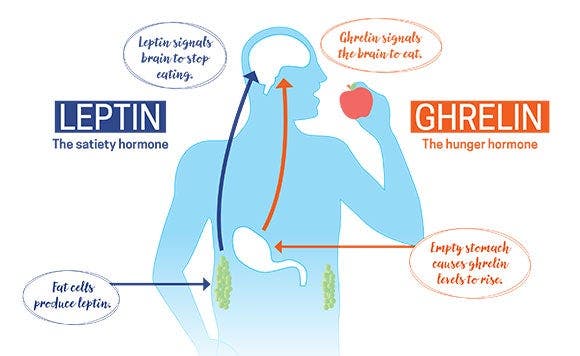How hormones impact your weight & appetite


Hormones and weight loss
You might have heard that weight loss comes down to a simple equation: eat less and move more. The reality, however, is far more complex. There are a number of factors that influence your everyday appetite and energy levels, and hormones play an important role. Learning about your hunger and satiety hormones and how to keep them in balance can give you another useful tool for managing your weight.
Why do hormones make you hungry?
There are more than 100 hormones in the human body, but two of them play a leading role in managing your daily hunger levels: Ghrelin and leptin. These chemical messengers tell your brain when it’s time to eat and when you’ve had enough, and – provided they’re playing nicely – they help to manage your energy level and maintain a healthy body weight.
“Leptin and ghrelin are hormones that regulate appetite and hunger,” explains dietitian Caitlin Reid. “Leptin suppresses hunger while ghrelin increases hunger.” Ghrelin, known as the hunger hormone, is produced in the stomach then enters the bloodstream to signal to the brain that you’re ready for a meal. “In the short term, ghrelin induces eating and, over the long term, this may lead to weight gain,” Reid says.
When your stomach is empty levels of ghrelin will rise sharply, but once you’ve eaten, it drops for around three to four hours as you digest food.
Its counterpart leptin is known as the satiety hormone. Produced primarily in the body’s fat tissues, leptin puts the brakes on your food intake, messaging your brain to indicate when you’ve had enough. Leptin is an important weight-loss hormone because it doesn't just monitor your meal size, it’s also thought to stimulate your metabolism. Its messages regularly update the brain on the status of your body’s energy stores – when they need topping up, and when it’s safe to burn some off. “Leptin is a long-term regulator of body weight,” Reid notes.
How leptin and ghrelin affect appetite
Put simply, it sounds like ghrelin is a gobble-inducing gremlin, while leptin is the sensible one, reminding you not to go overboard at the buffet. But this is where it gets complicated. When leptin and its receptors are functioning normally, you’ll be able to eat to the point of satisfaction and walk away from the table without wanting one more bite. So, the more leptin you have, the better, right? Well, not necessarily . . . If leptin’s messages aren't getting through to the brain, your body will fire off more and more leptin, but you’ll still feel hungry. This is called leptin resistance, and it’s a big problem.
“Fat cells can make lots of leptin, but that doesn't mean the leptin works the way it should,” says Reid. “In leptin-resistant people the brain doesn't listen to leptin, which means there isn't any drop in appetite. Because the brain doesn't get a signal to stop eating, they feel even hungrier and can gain body fat. More body fat means more leptin that doesn't do its job, and they end up eating more. It becomes a vicious cycle.”
While the jury’s still out on exactly what causes leptin resistance, it’s strongly correlated with obesity, and research published in the Journal of Endocrinology and Metabolism suggests that it can be triggered by prolonged periods of overeating.
Meanwhile, as the hormone that makes you hungry, ghrelin might sound like it’s trying to thwart your weight-loss efforts – but it’s actually an important survival mechanism for your body. It’s not entirely innocent, though – the hunger hormone also encourages abdominal fat storage. This kind of fat is considered particularly dangerous because it’s related to fatty liver disease and type 2 diabetes. So, keeping ghrelin in check is important not just for your weight, but your overall health.

How lack of sleep affects hormones
Lifestyle habits can have a big impact on hormonal function. Top of the disruptive list? Sleep – or, more accurately, lack of it. Have you ever noticed that when you’ve had an unexpectedly late night or set the alarm for crazy o’clock, it’s almost impossible to resist reaching for snacks throughout the day? It’s not a coincidence. “Lack of sleep can lead to increased levels of ghrelin and lower levels of leptin, increasing appetite and snacking the following day,” explains Reid.
A major study analysed data from more than 1000 volunteers and found that those who regularly slept five hours a night had 14.9 per cent more ghrelin and 15.5 per cent less leptin in their system than those logging a full eight hours. And it only takes one night of sleep deprivation to throw out these hormones, according to a study in the Journal of Sleep Research. Stress is often a side-effect of poor sleep, and it can be a trigger for spiking ghrelin, says endocrinologist Dr Claire Morbey. “Ghrelin is elevated following chronic stress and may lead to undesirable consequences over a long period of time,” she explains. The kinds of foods you tend to reach for when you’re tired can have a disruptive effect too, doubling down on the effects of stress and poor sleep. “Eating fat-rich food and foods high in sugar activates an inflammatory response in the hypothalamus (the main appetite centre in the brain), which disrupts signals from hunger hormones,” Dr Morbey explains. “This can lead to a resistance to leptin and an increase in body weight.”
7 ways to manage hunger hormones
Just as lifestyle can disrupt your hormones, there are some healthy habits you can adopt to give them the opportunity to do their best work. Try some of these tweaks to reset your leptin and ghrelin levels.
1. Create a sleep routine
Getting into a regular sleep pattern is one of the best things you can do for your hunger hormones and overall health – it’ll help keep ghrelin and leptin on an even keel, while giving you a good foundation for managing stress. Aim to get between seven and eight hours of shut-eye each night. If you struggle to wind down in the evening, making it a rule to switch off devices an hour or two before bed can help – the blue light emitted from screens can suppress your body’s sleep hormone, melatonin, and reduces your quality of sleep.
2. Manage your stress levels
Because stress can raise levels of ghrelin, making you feel hungrier, it’s important to keep it at bay. Everyone’s antidote to stress is unique, so work on crafting your own tension-busting solution. Meditation, yoga, long walks in nature or reading could be part of your self-care plan. The aim is to make it part of your routine, like exercise, so stress doesn't sneak up and overwhelm you.
3. Eat regularly
Both ghrelin and leptin disruption can result in the same problem – overeating. The key to keeping them balanced, however, isn’t to simply eat less, but to eat enough, regularly. “Eat regular meals that contain enough kilojoules and nutrients to meet your individual requirements,” says Reid. “Try to avoid both extremes of eating – eating too much or being too restrictive. This will help maintain your levels of leptin and ghrelin.”
4. Fuel up on fibre and protein
When you first start your health and wellness journey, you might feel hungrier as your food intake changes and ghrelin rises in response. The key to managing this. Fibre and lean protein are your friends. “Fill up with low-kJ soup, salad or lightly steamed veggies first. Use it as a preload (entrée) before the meal and it will help to fill you,” tips Reid. “Water and fibre-rich foods have a low energy density (amount of kilojoules per gram), and this helps to fill you up without the unnecessary kilojoules.” A serve of lean protein at meals will also help signal fullness, as it produces a strong satiety effect, Reid adds.
5. Get moving
Exercise plays a key role in your health. It also seems to help regulate appetite. Research suggests that moderate to high-intensity interval training can improve leptin function, while a UK study found that both aerobic and resistance training lowered ghrelin and its hunger signals. “Exercise may improve the sensitivity of the appetite control system to improve satiety and help weight-loss maintenance,” notes Dr Morbey. Adding a variety of workouts to your weekly routine could help to keep those appetite messengers working properly – and will give you a dose of happy hormones while you’re at it!
6. Eat more fish
Adding a few serves of oily fish to your weekly diet may improve leptin function. While more research is still needed in this area, it’s thought that increasing your intake of omega-3 fatty acids, found in fish such as salmon and mackerel, could help your brain pick up those all-important ‘I’m full’ messages. “Omega-3 is correlated with prevention of obesity,” says Dr Morbey. Fish is also a great source of protein, helping to keep you feeling satisfied for longer, so it’s a healthy way to keep hunger pangs at bay, too.
7. Try mindfulness
Perhaps your mind is one of the most powerful tools you have at your disposal when it comes to managing those hunger hormones is your mind. Taking care to tune into your body when you eat is a great way to keep both ghrelin and leptin operating normally. “Be mindful with your eating – take the time out to sit down and enjoy it,” says Reid. “Reduce distractions like TV, as not concentrating on eating distracts you from your internal signals that tell you when you’ve had enough.” If it’s difficult for you to distinguish those satiety signals when you’re facing a delicious bowl of pasta, eating till you’re 80 per cent full might be a good guideline to follow. Known as hara hachi bu in Japanese, it allows your brain and body the time they need to register how much you’ve eaten.
